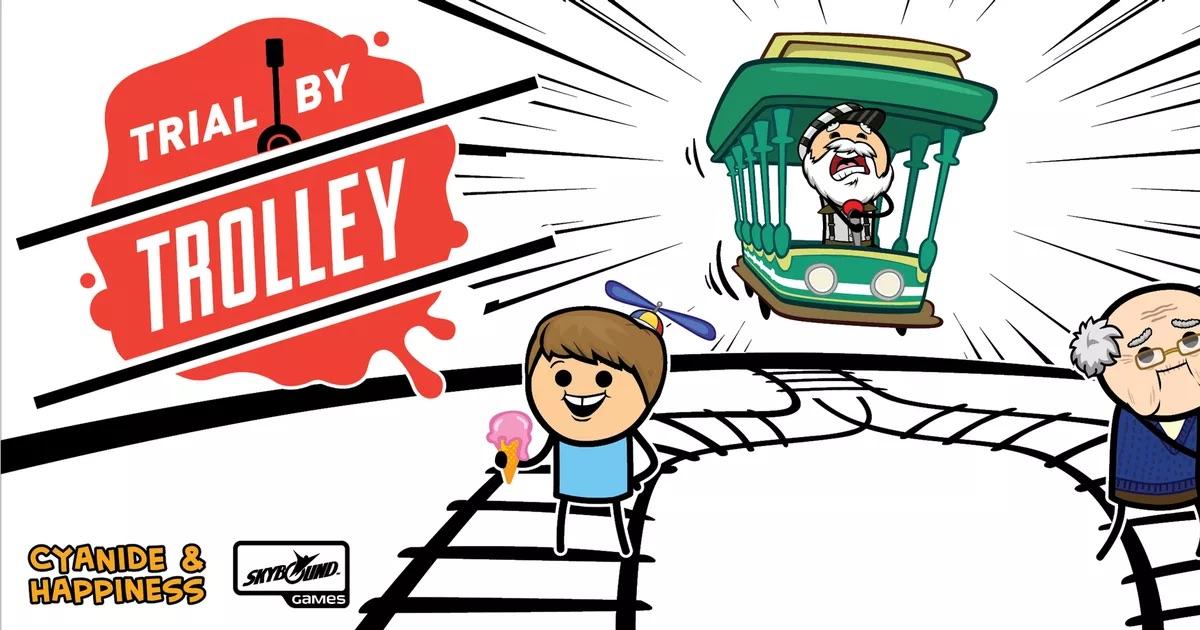For the competitive/comparative analysis game, I played Trial by Trolley. It takes the classic trolley moral dilemma and spins it into even more absurd scenarios. The set up is simple as the game splits players into two teams with one conductor role. Each team draws from a series of different cards that make up their “train track”. Once the cards are all laid out, the teams take turns making an argument as to why their track should be saved, or the other track should face the trolley.
With this simple concept, the main highlight of the game is in the cards. There are hundreds of cards with the utmost bizarre and absurd prompts. The ingenuity comes in the combinations of these cards. Essentially, there are three tiers of cards: innocent, evil, and modifier cards. Innocent cards are played on your own track and are often used in favor of not running over your track. The evil cards are played on the opposing team’s track and are often used in arguing for running over that track. Lastly, there are modifier cards that can be played anywhere on any card and can even turn an innocent card, evil or vice versa. With this, follows the game’s core mechanic of arguing.
In relation to the game that my team is developing, the overlap exists within the cards. Since our concept hinges on dance prompts for players to fulfill, these two games interact in similar realms, but are played differently. Our game’s core mechanic is also on memorizing the chain of dance moves as opposed to a talking-focused game. From the initial team play test and this critical play, I’ve noticed some shared struggles across both games. The first is the most urgent: replayability. Since both games hinge on card prompts, once all the cards have been played, there is nothing new or refreshing about them. In the play test of our game, we hit this bottleneck really quickly as we had only come up with about 20 different dance prompt cards. In Trial by Trolley, they circumvent this problem in two main ways: having a huge supply of cards, and combining them. According to Google, the game contains 500 cards total, with 200 innocent, 125 evil, and 175 modifier cards. With such a huge amount of cards, it will be a challenge within itself to play all of them. Secondly, by allowing the combination of cards the game still ensures some level of freshness from repeated cards. However, in spite of this, while playing the game and discussing it with the other players, everyone had a shared sentiment: this game gets old fast. Even though there’s a combination of cards, we ended up only focusing on one or two cards to really advance our arguments.
This itself comes down to another drawback to Trial by Trolley: card balance. Some cards are insanely more powerful than others. For example, in the first round that I played, I received a Genie card on my track. With this, I was able to argue in support of saving my track as the Genie would allow the conductor to essentially reverse the deaths on the other track (or at least have the agency to do so). Cards that allow the players to escape the moral dilemma itself seem to break the game’s own magic circle.
With this, it can get incredibly challenging to argue in favor or against certain tracks because one is much more objectively superior to the other. There is a caveat to this however. I believe this isn’t as much of an issue if it is played between close friends who know each other well. Because I played Trial by Trolley at game night, while it did allow me to get to know my fellow students better, I wasn’t able to completely leverage how much I knew a person’s values and beliefs to make the most compelling argument. In this scenario I managed to achieve a different objective (getting to know my classmates) while sacrificing a portion of the (intended) fun.
[Imbalanced tracks from played experience, top track was more favored in both attack and defense]

From playing Trial by Trolley, I’ve learned that the idea of prompt cards can be initially engaging and fun, it can also get boring quickly. The main conceit of the game still has to be fun for players to buy in. For Trial by Trolley it is arguing (and people do love arguing), but if the stakes of the argument don’t exist or are easy to break, it becomes less meaningful and therefore less fun. Similarly, I’m thinking if the main concept of my game is fun enough for players to return to: memorizing dance moves. The prompt cards are only an enhancement, but they definitely can make or break the game as well.





